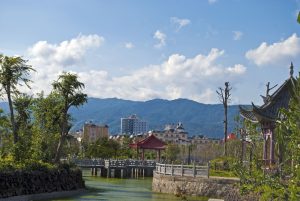The Chinese government has locked down a city in Yunnan province, after two travelers from Myanmar tested positive for the coronavirus. The city of Ruili, which sits on the border with Myanmar, has gone into “wartime mode” since the two imported cases were detected on September 3. Local authorities have since launched a campaign to test the city’s population of more than 200,000 people.
Ruan Chengfa, deputy secretary of Yunnan’s party committee, said that authorities were implementing a strict policy of “complete inspection, strict quarantine. No entry and no exit.” As of September 17, more than 360 testing sites has been set up in Ruili, the primary crossing point on Yunnan’s 2,200-kilometer shared border with Myanmar. Almost 1,200 health workers have been deployed to conduct testing.
While the virus appears to be under control in much of China, Myanmar has seen a recent spike in COVID-19 cases. On September 17, the country’s health ministry announced seven more coronavirus-related deaths and 258 infections, bringing the country’s total to 3,894 confirmed cases and 46 fatalities. The sudden spike in cases threatens to overwhelm Myanmar’s ramshackle health infrastructure, and has recently sparked calls to postpone the country’s upcoming elections.
With COVID-19 on the rise in Myanmar, it was always likely that the contagion would sooner or later make its appearance in southwest China. The remote, poorly-policed border between Myanmar and Yunnan has long been notorious as a surging conduit of illicit trades, from luxury hardwood, jade and endangered animal parts to Chinese-made precursor chemicals that fuel the methamphetamine labs of Myanmar’s Shan State. These goods are accompanied by tens of thousands of illegal migrant laborers, sex workers, day traders, and border-hopping Chinese tourists who go to gamble in the region’s host of border casinos.
On the Myanmar side, long stretches of the border are controlled by ethnic armed groups that govern a patchwork of independent enclaves. At the same time, local authorities in Yunnan have often turned a blind eye to smuggling and illegal border crossings, given their importance to the local economy. As a result, large parts of the border region lie beyond the effective control of either Beijing or Naypyidaw.
In a press conference on September 14, Yang Bianqiang, deputy director of the police department in Dehong Prefecture, where Ruili is located, admitted the difficulties of securing the border. “There is no natural border between Ruili and Myanmar,” he said. “Citizens in Ruili and Myanmar speak the same language and visit each other very often. It is difficult to monitor their travels.”
Nonetheless, Yang said that the two infected people who crossed the border illegally would be prosecuted, and promised that the authorities in Dehong would increase patrols of the border. He also said that the city’s residents would be encouraged to report illegal crossings.
Given the region’s long history of resisting central state control, they might have their work cut out for them.

































